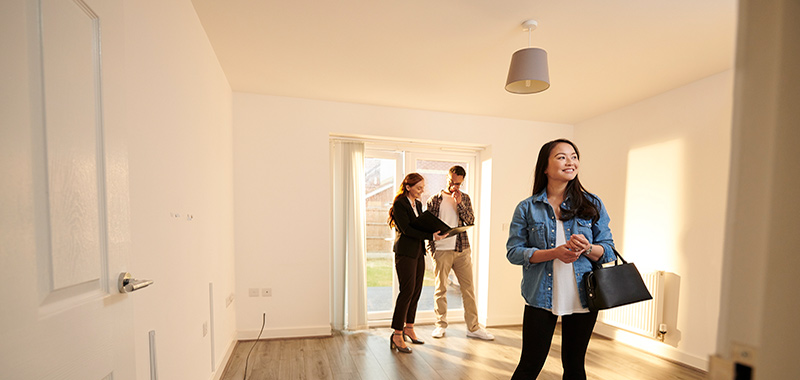Paying a Mortgage vs. Paying Rent: What's the Difference?
By
ASB February 10, 2023 | 6 MIN read PersonalYou’re sitting at the kitchen table with another cup of coffee in the nighttime glow of your laptop. You’ve got a blank spreadsheet on your desktop, hidden behind tabs and tabs of places to rent alongside real estate listings. What’s the right choice?
One thing we know for sure: housing in our island home can be complicated. Taking the path that makes sense for your ‘ohana - especially family finances - is a key ingredient to creating stability and a long-term ability to thrive. So let’s talk mortgage vs. rent.
ASB’s Edina Galla, vice president and executive loan officer, explains the difference in a way that makes it easy to understand, so we have a good starting point. Put your hands in your two front pockets. Now imagine that the pocket on your right is where you keep your cash. The pocket on the left is where you’re saving for your future. They’re both your pockets, both hold your money. And every month, no matter what, you’re taking some dollars out of your right side cash pocket to pay for your housing.
As a renter, when you take that cash out of your right side pocket, you’re handing it to your landlord. It goes into her cash pocket, and your lease agreement keeps going.
As a homeowner with a mortgage, something different happens. Some of your cash gets handed over to the bank -- that’s the part that pays for your loan -- but part of it goes back into your left side savings pocket, where you’re saving for your future. That part is in the form of equity, the value you’re accumulating in your property, that could be worth a lot to you in the future.

Why choose to rent?
Now, let’s talk reality. According to the US Census Bureau, about 40% of Hawaiʻi residents are renters, which is a few percentage points higher than the national average. Like it or not, those stats show that for plenty of folks renting might make more sense than buying. Some of those factors are really important to consider:
- Flexibility. If you’re an adventurous type who gets an itch to relocate every couple of years, it’s important to remember that ending a lease is far simpler than selling a house.
- Cash on hand. The expense of moving into a new rental is far less than the expense of moving into a newly-purchased house. A rental agreement usually requires a deposit equivalent to one month’s rent. But if you’re buying, you’ll hand over a pretty big chunk of change before the moving boxes come out - you need to account for your down payment, but also a range of closing costs that can stack up more than some folks realize.
- Timing. If you are at a place in your life where you expect your needs to change, it’s important to keep in mind that you may not really start breaking even or saving money until a few years into your mortgage, compared to renting. If you expect to move into something else within 5 years, renting may make more financial sense.
- Time for upkeep. One of the best perks of renting is that someone else is responsible for fixing things that break, but when you’re the homeowner, that person is you. If the toilet stops flushing, the washing machine breaks down or the shingles blow off the roof, being a homeowner means you also need to set aside time (and dollars) for upkeep on your property; if you’re a renter, it’s a call to your landlord or property manager instead.
- Commitment. If you’re frustrated with your career and thinking about a change of pace, or you’re on the verge of starting your new entrepreneurial project, the last thing you want is to get stuck in a job you hate because of your 30-year promise to make mortgage payments every month.
Why choose a mortgage?
If you’re in a place in your life where you have a pretty good idea of what you’ll need and how your finances will hold up, there are also some important reasons that motivate folks to choose the commitment of a mortgage to become homeowners. Benefits of a mortgage include:
- Long-term savings and stability. It can be alarming to look back at how rents have risen over time - one 2023 report showed a 15% jump year over year for the average 2-bedroom rental in Honolulu. But when you lock in a mortgage, you know exactly how much you can expect to pay for as long as your loan’s rate is fixed (a full 30 years for your typical fixed-rate mortgage, or a set number of years you agree upon if you choose an adjustable rate mortgage or ARM). And in somecases your monthly mortgage payment eventually ends up being less than the rent on that same kind of property would have been, given the reliable increases in rent rates over time.
- A financial investment. Let’s go back to the pocket example. Lots of folks have a hard time with the idea that they’re taking money out of their pocket so that their landlords can use that cash to build equity for their futures, instead of using those same dollars to build equity for our own ʻohana. On top of that, we know that in Hawaiʻi even more than other places, the financial value of real estate will consistently go up as years pass -- one of the safest bets you can make when considering investment options for your nest egg. And remember, a first home purchase doesn’t have to be THE home purchase: it can be a really useful equity-building stepping stone towards your long-term dream home.
- A future for the next generation. If you are at a place in your life where you expect your needs to change, it’s important to keep in mind that you may not really start breaking even or saving money until a few years into your mortgage, compared to renting. If you expect to move into something else within 5 years, renting may make more financial sense.
- Time for upkeep. A motivator for many local families is to hold a spot for their kids - and maybe even their kids’ kids - to be able to have a home here, to be able to stay in Hawaiʻi as adults. When we’re done paying rent and a lease is up, we part ways and move on from a property, but when we’re done paying down a mortgage, that property belongs to the ʻohana free and clear to hold onto and to use for the benefit of our families and our future.

So… mortgage vs. rent?
The rent vs. mortgage question really boils down to two things:
- Are you at a place in your life where a big commitment, over a long term, makes sense for your family?
- Will the monthly costs make sense within your budget?
There’s no right or wrong here, just a set of important questions to ask to make the best financial decision for you and your ʻohana. Understanding the variables means a bunch of math, so playing out the scenarios in ASB’s Rent or Buy calculator tool can help to sort out the smart and realistic from the unwise. And if you think you might want to make the leap, here are some tips to start saving for your home purchase.
And nothing beats talking it out with one of our ASB loan officers; after all, it’s their job to explain the in’s and out’s of this stuff, and help you make a plan that fits your life and your goals. Get in touch with a mortgage loan officer today.




